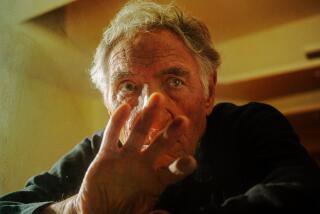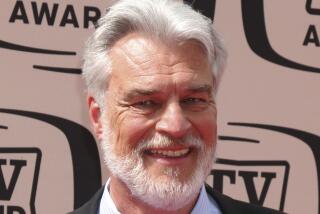Ray Milland Dies of Cancer : Actor Won Fame for ‘Lost Weekend’ Role
- Share via
Ray Milland, who said he was a screen star for years before he understood enough about acting to handle his Oscar-winning role as Hollywood’s most memorable alcoholic, died Monday at Torrance Memorial Hospital where he was under treatment for cancer.
He was 78, and his longtime agent, Roland Leif, said he died quietly in his sleep after being admitted last Thursday.
“He had suffered from cancer for several years,” Leif said, “but aside from some occasional back problems, his health only began to deteriorate in the last few months.”
In “The Lost Weekend,” his most famous role and the one for which he won a 1946 Oscar as best actor, Milland played a dipsomaniac young writer so convincingly that he even fooled some friends into thinking he actually had become an alcoholic.
It happened, he later explained in his autobiography, during the filming of some sequences in New York City. As camouflaged cameras were shooting, a purportedly drunk Milland was staggering along 3rd Avenue when a friend saw him.
When the friend returned to Los Angeles she called Milland’s wife and told her that her husband had become a bum. The story of Milland, the drunken derelict, was picked up by some of the Hollywood trade papers.
A frantic Mal Milland called her husband. And Milland, as he later wrote in “Wide-Eyed in Babylon,” published in 1974, called Paramount Studios, which squelched the rumors.
Until “The Lost Weekend,” Milland had been perceived in Hollywood as a light leading man with a ready smile and an agreeable disposition. He had never been regarded as an actor capable of handling a serious part.
Even he had doubts about whether he could play the role of Don Birnam, the writer staggering down 3rd Avenue, trying to pawn his battered typewriter.
“It was the first real job of acting--the first assignment to play someone other than myself--I’d ever been offered,” he told an interviewer later. “I wasn’t at all sure I was ready for it; that I knew enough about my craft. But I had to try. . . .”
To become Birnam he had to reduce to 160 pounds, skeletonizing his 6-foot, 2-inch frame. He even managed to get himself admitted to New York’s Bellevue Hospital, where he spent part of a night with some bums.
“I could not abide being in the company of people who were drunk; they made me tense and very nervous. I never knew what to say to them,” he said later.
Success in “The Lost Weekend” was a major coup for Milland, born Reginald Alfred Truscott-Jones on Jan. 3, 1908, near the town of Neath on the west coast of Wales.
He described how he acquired his stage name this way:
“When I first arrived in Hollywood, they told me to get a new name. I thought back to the times when I was a kid playing on the tidal land around Neath.
“When the water went down, there were pools where I used to catch shrimp and shellfish. There was a tannery and there was a genuine old mill by the stream. . . . I thought, I’ll take that name: Mill Land. I called myself Jack Milland, but in Hollywood they said that only dogs were called Jack . . . so I looked down a list and picked the shortest name I could find--Ray. That was back in 1929, and it stuck to me ever since.”
In the 1930s and ‘40s Milland’s credits included “The Man Who Played God,” “Beau Geste,” “Three Smart Girls,” “Bulldog Drummond Escapes,” “Charlie Chan in London,” “French Without Tears,” “Reap the Wild Wind,” “California,” “The Trouble With Women” and “Arise My Love.”
Milland also appeared in “Polly of the Circus” with Clark Gable and Marion Davies; “We’re Not Dressing” with Bing Crosby, Carole Lombard, Ethel Merman and a 6-foot bear that could roller skate; “The Jungle Princess” with Dorothy Lamour, and “Gilded Lily” with Fred MacMurray and Claudette Colbert.
In 40 years in Hollywood, Milland appeared in 196 movies.
Milland got his first movie role by accident because a German marksman who had been hired as a sharpshooter in “The Informer” was hit by a bus. The desperate producers approached the British War Office for a replacement. Milland, then a young soldier in the Household Cavalry of the British Army, was selected. He said the producers handed him a rifle and told him to fire into a chalk circle that had been drawn around a half-dollar.
Milland had joined the cavalry at 18 and developed a talent for shooting which produced a number of marksmanship awards. He proceeded to fire 11 shots in 10 seconds into the circle and said the bullet holes were so close together they could have been covered with a quarter.
“I couldn’t have done it again. Nobody could. I got the job,” he said.
Without any previous acting experience, he appeared in “The Informer,” followed by a role in “The Flying Scotsman.”
Contract With MGM
He soon signed a contract with Metro-Goldwyn-Mayer. The nine-month contract, at $175 a week, included round-trip transportation, and expenses, to Hollywood.
On Aug. 17, 1930, Milland sailed for New York. In Hollywood, he met and married Mal Weber. But, after he appeared in “Payment Deferred” in 1932, MGM dropped his option.
Milland was 25. His acting career apparently was at an end and his marriage in trouble. He sailed home to England.
But he decided to return to Hollywood, where he was forced to take a job in 1934 as manager at a Sunset Boulevard service station for $27.50 a week. On his way home from that job interview, Milland was so broke that he had to get off the bus at Van Ness and Melrose avenues, because he did not have the full fare back to his apartment.
It proved a fortuitous calamity because he stopped by the Paramount studios, where he was offered a two-week contract at $300 a week for a role in “Bolero,” where he substituted for another English actor who had been injured.
Reconciliation With Wife
Soon after that Paramount signed him to a seven-year contract at $175 a week. It was the beginning of a long relationship. Shortly after that, Milland and his wife were reconciled.
At Paramount, he played everything from cowboys to playboys and aviators. He was the devil in one movie and an 18th-Century English procurer in another.
But despite the success, Milland remained an introvert, a man who invented all kinds of excuses to avoid movie openings and exhibitor meetings.
“I got out of most of those by having a relative die suddenly,” he wrote later. “I honestly believe I had more relatives kick the bucket than any individual west of the Rockies.”
In late life, he reflected that it took him time before he realized that acting was an art that had to be learned. Before that he had taken it for granted.
After “Lost Weekend,” he became more secure as an actor and was able to defy the studios, drawing a two-month suspension from Paramount in 1948 for refusing a role in “Bride of Vengeance.” He said he turned down the role because he felt that it would make a lousy movie.
His later films included “Dial M for Murder” in 1954; “The Premature Burial” in 1962; “Love Story” in 1970; “The Thing With Two Heads” in 1972, and “Escape to Witch Mountain” and “The Last Tycoon,” both in 1976.
But he never again achieved the distinction or earned the awards that “Lost Weekend” had provided.
He branched into other areas, becoming a movie director, writing 24 short stories, most of them under pseudonyms, starring in the television series “Markham” in 1959 and “Rich Man, Poor Man” in 1976, when he was 68.
He also made several appearances as Stephanie Powers’ father on the ABC series “Hart to Hart” and played a featured role in the 1982 CBS television movie “Charles and Diana: A Royal Romance.”
He retired several times and moved to Europe, only to return to Southern California.
He leaves his wife, Mal, a daughter, Victoria Francesca Graham, and two grandsons, Travis and Alex Graham.
There will be no funeral services, his agent said. The body will be cremated.
More to Read
The biggest entertainment stories
Get our big stories about Hollywood, film, television, music, arts, culture and more right in your inbox as soon as they publish.
You may occasionally receive promotional content from the Los Angeles Times.










